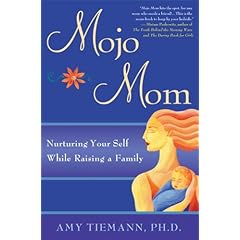
I launched the weekend by reading my first official parenting book: Amy Tiemann’s mojo-y book, Mojo Mom: Nurturing Your Self While Raising a Family (the new editiion!). And I am so thankful to have started here. Many of you are familiar with Amy’s message from reading her blog (Mojo Mom), but in all honesty, it didn’t really sink in for me of course until I got pregnant. Now it’s all gotten very personal. And what a relief that this book exists.
Chapter 1 begins: “It is tempting to romanticize miraculous transformations.” The chapter’s epigraph reads: “Sometimes you just have to take a leap and build your wings on the way down.” Still barfing at 13 weeks, I’m having a wee bit of a hard time when well-intentioned friends and loved ones say to me “this is such a special time! enjoy each moment!” Because it’s hard to enjoy it all when you’re on the verge of 24/7 puke. Believe me, I am overjoyed beyond belief that I am at this particular juncture; but overjoy and “enjoy” are not the same thing.
But I digress. I really wanted to use this post to send a HUGE shout out to Amy for writing this book, and for writing a second edition of it, one which addresses more of the cultural conversation around motherhood. I’d been feeling intimidated by all those books with light pink covers written about pregnancy and mothering and couldn’t bring myself to read anything other than The Mayo Clinic Guide to a Healthy Pregnancy, which Marco picked out for me early on. Mojo Mom is helping me build confidence that I will find my own way into this whole pregnancy and motherhood gambit, that there are motherhood books written for women like me, and that there are fellow travelers out there–Amy did a PhD in neuroscience and is on the executive team of MomsRising.org (and a longtime supporter of Women for Women International)–to guide the way.
For some more hardcore political reading, definitely check out the opeds in today’s NYTimes on what to give mothers in the developing world, and the stats and links Kyla rounded up over at The REAL Deal (“Motherhood by the Numbers”).
And to all the moms out there, the moms-in-the-making, and the moms-in-waiting (I have a number of friends in this latter camp), and to my own extremely amazing mother, who I am becoming more and more grateful for every day, HAPPY MOTHER’S DAY!

 Well, here we go. I’ve decided today is the day to officially “come out”: I’m pregnant! I’m 12-and-a-half weeks along, and here’s the kicker: it’s twins. OMG OMG Marco and I are still getting used to saying that out loud. “It’s twins.”
Well, here we go. I’ve decided today is the day to officially “come out”: I’m pregnant! I’m 12-and-a-half weeks along, and here’s the kicker: it’s twins. OMG OMG Marco and I are still getting used to saying that out loud. “It’s twins.” I’m supershort on battery so may only get through part of this next session, but here we go…
I’m supershort on battery so may only get through part of this next session, but here we go… Lisa Belkin, ever on top of the nuances and foibles of dating, mating and family making in our time, points in
Lisa Belkin, ever on top of the nuances and foibles of dating, mating and family making in our time, points in  So this just well may be my favorite annual report out there, and it’s just out now:
So this just well may be my favorite annual report out there, and it’s just out now:  Over at Broadsheet this week, Amy Benfer has
Over at Broadsheet this week, Amy Benfer has  Following on the heels of Stephanie Coontz’s awesome op-ed last week in the NYT (
Following on the heels of Stephanie Coontz’s awesome op-ed last week in the NYT ( Well,
Well,  I return after a most serious case of blogger’s block (yes, there is such a thing – wikipedia entry and all.) Initially, I thought it was just a post holiday digging out from all that gets put aside, but, no, I simply couldn’t sit down to write.
I return after a most serious case of blogger’s block (yes, there is such a thing – wikipedia entry and all.) Initially, I thought it was just a post holiday digging out from all that gets put aside, but, no, I simply couldn’t sit down to write. I’ve seen books that teach you how to apply lessons from private life to leadership in the office, but this one takes leadership skills from the office and applies them to the home. The whole premise of Jamie Woolf’s
I’ve seen books that teach you how to apply lessons from private life to leadership in the office, but this one takes leadership skills from the office and applies them to the home. The whole premise of Jamie Woolf’s 